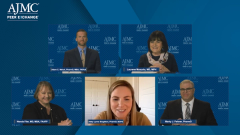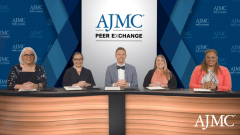
Clinical Goals for Treating RSV
The panel discusses potential therapy options for adults infected with respiratory syncytial virus.
Episodes in this series

Adam C. Welch, PharmD, MBA, FAPhA: Dr Mascola, we’ve talked a lot about RSV [respiratory syncytial virus]. How do you treat RSV?
Laurene Mascola, MD, MPH: That’s a very good question. Unfortunately, there’s no treatment for RSV in adults. All the treatment is just supportive. If patients are hospitalized, we use hydration, and we give them oxygen. We might do chest percussion and antipyretics. We might want to prevent bed sores, but there’s no definitive treatment for adults with RSV. They’ve used bronchodilators and corticosteroids, but their benefit is not known. There are trials using antivirals in adults, but those haven’t progressed to phase 3. There’s no treatment for adults with RSV.
Adam C. Welch, PharmD, MBA, FAPhA: Are there any treatments that are possibly effective in this population?
Laurene Mascola, MD, MPH: There are some trials looking at monoclonal antibodies and antivirals. But they haven’t progressed to the point that we can use them in the adult population.
Wanda Filer, MD, MBA, FAAFP: Most of the time, if I see a patient wheezing, I might put them on albuterol to try to open their airway. We may even give them a course of steroids to try to break it. If we’re past that first 2 weeks, and the virus is not an active issue, I try to manage the symptoms. This is the farm girl in me, but the horse is out of the barn. This is where primary prevention would have been nice. It would be nice to have had that individual immunized. If they do get sick, then you have a chance to test them and find out it’s RSV and understand what we’re dealing with.
Laurene Mascola, MD, MPH: Also, if they get the secondary complication of pneumonia, then you have to use antibiotics. All those things drive up the cost of hospitalization. Sometimes patients start with antibiotics, which causes overuse and abuse and can lead to multidrug-resistant organisms, but we’re dealing with an just RSV infection. At this point, the only thing available for adults is primary prevention, which will be through vaccination. Without vaccination, RSV will continue to ravage high-risk adults and those with underlying comorbidities.
Adam C. Welch, PharmD, MBA, FAPhA: It seems that prophylaxis is important in RSV to help control the costs and the clinical burden of this infection. Mr Feltner, with RSV vaccines on the horizon, what are some of the financial and clinical goals associated with immunizing against RSV?
Marty J. Feltner, PharmD: The main clinical goal is disease prevention. We need to immunize to prevent RSV infections. But we need to decrease morbidity and mortality rates and disease burden. We want to keep our patients safe, and we need to look at vaccinations for RSV as we do for influenza. If we go down that path, especially from a marketing perspective, we’re all going to be successful. We want to decrease the financial burden on the health care system. That’s key. We need to do more testing. We’re going to treat the symptoms symptomatically, typically in the pharmacy sector, but how many of those have RSV? We don’t know unless we’re testing.
Laurene Mascola, MD, MPH: It’s important to know who has RSV vs influenza vs COVID-19 because there are treatments specific for COVID-19 and for influenza, but there are no treatments for adults with RSV. Diagnostics are important. You might test for COVID-19 or influenza, but you definitely don’t test for RSV. We need to start doing that so we can understand the disease burden and recommend vaccination. Then we’ll be dealing with the diseases that we have treatments for in addition to vaccines.
Adam C. Welch, PharmD, MBA, FAPhA: When we talk about RSV vaccines, the economics have been modeled out. We have some data, both from the vaccine manufacturers as well as the CDC [Centers for Disease Control and Prevention], which has done economic modeling with vaccines. Tell me a little more about the value of these vaccines in terms of cost savings.
Laurene Mascola, MD, MPH: The CDC has looked at how many individuals need to be vaccinated to prevent 1 case of the disease. We’ll do fine-tuning later. But it’s always important for the CDC to look at the cost of hospitalizations prevented by vaccination.
Adam C. Welch, PharmD, MBA, FAPhA: When you do this economic modeling, you estimate what you think would happen and plan for all the contingencies that could happen in each direction. The costs presented by the CDC, through a study it had done with the University of Michigan, were $180,000 to $189,000 per quality-adjusted life year. That varies greatly from what the vaccine manufacturers had come up with, which was $43,000 to $68,000. The considerations given on that CDC model were that the vaccine would have a base cost of $100 per dose, that its vaccine efficacy would be about 1 year, and that we would be vaccinating patients aged 65 and older. Those factors could change, and it could vary the economic model of these vaccines when they become available. But it’s a moving target, and we’re going to need more data to evaluate this more thoroughly.
Wanda Filer, MD, MBA, FAAFP: You raised a point that we may not have touched on: the expectation is that this RSV vaccine will be an annual vaccine. If it gets approved and gets put on the schedule at the June ACIP [Advisory Committee on Immunization Practices] meeting, it will probably be an annual vaccine. It needs to get into the public consciousness, like a flu vaccine, because it isn’t 1 and done.
Laurene Mascola, MD, MPH: The other thing is the age the recommendations are going to be for. We’re looking at older adults, the most at risk over age 65. Even if you’re healthy, you’re immune incompetent. But some patients 60 years and older are at risk for RSV infection, especially if they have underlying comorbidities: bone marrow transplant and other immune deficiencies might make them very frail. Maybe they’ll be considered for vaccination as well. For those 65 and older, the vaccine will probably be covered by Medicare Part D, which has no co-pay. We’ll talk about that later, but we need to think about those 60 years and older. Maybe they’ll be considered for vaccination at some level.
Marty J. Feltner, PharmD: Another point is that individuals over 65 usually take our recommendation. They say “I need my flu shot. What other vaccines do I need?” We’re pretty successful in that age group because they’re keyed in on vaccine recommendations. Vaccine hesitancy and fatigue is our biggest barrier. However, I still feel that we’re going to be successful with the rollout of an RSV vaccine later this year because older adults are in tune with those recommendations. I’m not sure if you saw that in your practice, but that’s what I saw in our pharmacies.
Wanda Filer, MD, MBA, FAAFP: The crux is what are the recommendations going to be when they come out. Many of us are hoping it’s 60 years old, not 65. That raises a different issue for the cohort in that is aged 60 to 64. I’m 1 of them. What’s that going to look like? What barriers might they face?
Laurene Mascola, MD, MPH: I don’t want to be a Debbie Downer, but look at how long the flu vaccine has been on the market. Last year was the highest rate of flu coverage in adults over age 65. That was about 60%. Usually, we’re at 40% for coverage for influenza in adults over 65 years old. We still have a long way to go for flu coverage, and that’s before we add new vaccines like RSV and COVID-19. We have to be optimistic that they’ll come, but we also have to be very persistent in reminding them.
I like your reminder that you give patients. We get reminded to get our hair done, our oil changed, our pets groomed. Reminders are very important for any age population to make sure they come in. Sometimes pharmacies call me at home to say, “Have you gotten this vaccine or that vaccine?” I like that. They’re a pain in the neck, but at least I know I need to get a vaccine. Persistence is still going to be key for all those vaccines. We might think that everyone over 65 is being vaccinated, but the data don’t show that to be true.
Transcript edited for clarity.
Newsletter
Stay ahead of policy, cost, and value—subscribe to AJMC for expert insights at the intersection of clinical care and health economics.











